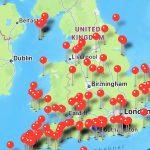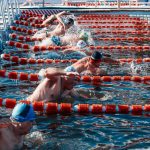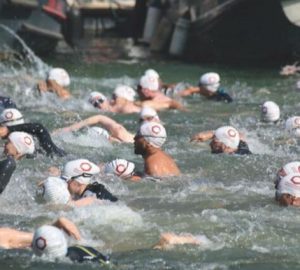To race or not to race?
Open water swimming events give me a dilemma that never seems to come up in pool competitions: should I push my limits and race or hold back, soak up the atmosphere and savour the occasion?
This weekend I was lucky enough to be in Altea, Spain, for the first race in the Oceanman Series. It was a lovely 10km sea swim mostly parallel to the coast with a detour around a couple of small islands near the start. The week before I took part in a masters gala where I did a 400m swim in a pool. I was much more nervous about the shorter swim, which strikes me as odd as it was seemingly the easier of the two. However, in a pool race there are only around five or six other competitors in the water at the same time. You have a lane to yourself, every lap is timed and officials scrutinise your start and turns to make sure you don’t cheat. At the end you have a time that can be compared with past and future performances and rated – extremely unfavourably in my case – against world records. There’s something about that set-up that encourages you to push your body to its absolute limit.
Open water swimming is different. Finishing times are never fully comparable as there is so much variability between events and (I think) it’s always a good idea to hold something back as it’s often hard to gauge the exact time and distance to the end and the water conditions may change suddenly.
The organisers of Oceanman clearly intend the swim to be a race. It’s chip timed and the top 10 swimmers from each age group will qualify for Oceanman’s final race of the year in Benidorm, in October, along with the top performers from the series’ other races.
On the other hand, Oceanman has grown out of Swim the Costa Brava. Daniel and Aida, the creators, have spent years exploring and swimming along this stretch of coast. They know the best spots and enjoy sharing them. The Altea swim starts at the scenic end of town, takes swimmers past two rocky outcrops and offers them views of the cliffs. The water is shallow so you can see the bottom and watch fish darting in and out of the sea grass. The route then turns back so that participants can swim along the urban waterfront before finishing near the harbour in the town centre.
This means the swim is also one to be enjoyed and relished – and it’s hard to do that when you’re racing at your physical and mental limits.
I spent the first part of the swim trying to keep pace with a group, and it was stressful. I had to stay focused on matching any changes of pace and stay alert to avoid collisions. I then decided to stop and have something to eat before continuing on my own. My experience improved immediately. The Mediterranean is a big expanse of water. It seems a shame to spend my time in it swimming right next to someone else’s feet, despite the potential energy savings from drafting. This decision almost certainly cost me several minutes and possibly a place or two in the final rankings – but I’m glad I did it.
There’s nothing wrong with racing. I enjoy the tactical, combative challenge of it as much as many other swimmers, but I do also really love being in the water and just swimming for the sake of it without pushing my limits. As someone with a competitive pool swimming and triathlon background I do sometimes have to remind myself that not every open water event needs to be treated as a race. The primary objective does not always need to be to get to the end in as short a time as possible. It’s OK to relax, hold back, day-dream, watch the fish, focus on improving your technique or whatever you want while you swim. It’s just as fine to race. That we have the choice is yet another of the joys of open water swimming and I hope it’s something we convey in H2Open Magazine and that distinguishes us from triathlon and other sporting magazines.






